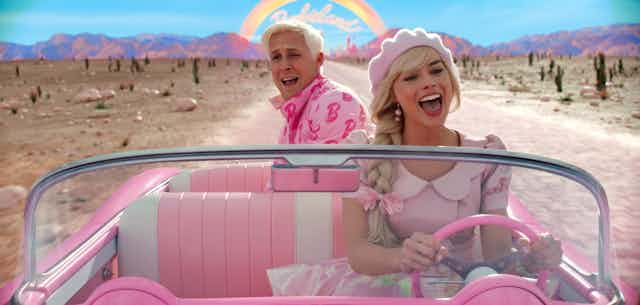The following article contains spoilers for Barbie.
For some, Barbie is the ultimate “girlboss” – she’s glamourous, successful and owns her own DreamHouse. For others, Barbie represents an outdated female stereotype – a “blonde bimbo girl in a fantasy world”, according to Aqua’s 1997 hit song Barbie Girl.
Just ask the man with the megaphone stood outside the press screening of the new Barbie film that I attended in Leicester Square. Vehemently protesting the film, he insisted that Barbie is a bad role model and a danger to young women.
But Barbie fits perfectly into director Greta Gerwig’s repertoire of women-focused stories, which includes two Oscar-nominated coming of age films, Ladybird (2017) and Little Women (2019). Gerwig is a feminist filmmaker whose characters are curious, transgressive and rebel against their restrictive circumstances. Barbie is no exception.
The film follows Stereotypical Barbie (Margot Robbie), whose perfect life in Barbieland is gradually falling apart because the humans playing with her in the real world are sad. Her arched Barbie feet become flat, she gets cellulite on her thighs and becomes troubled by thoughts of death.
With the help of Weird Barbie (Kate McKinnon) – comically styled as if a child “played with her too hard” – Stereotypical Barbie is tasked with entering the real world to find her human family and solve their problems.

The film opens with a parody of a famous scene from Stanley Kubrick’s 2001: A Space Odyssey (1968). The world is thrown into disarray when a giant Barbie doll lands in the desert like a UFO. Through Helen Mirren’s terrific narration, we are told that the inhabitants of this barren wasteland are a hoard of little girls who only have baby dolls to play with. The girls are liberated by the arrival of their exciting new friend and, tired of playing at being mothers, they smash up their bland baby dolls for good.
This opening positions Barbieland as a feminist utopia. In Barbieland, women can do anything: become president, win literary awards and throw fabulous parties.
Barbie in the real world
Gerwig’s take on Barbie is timely. My research explores the recent feminist reclamation of the “bimbo” figure. On TikTok, the #Bimbo trend sees feminine-presenting content creators reclaiming the once derogatory “bimbo” label and aesthetic. Instead of abandoning femininity to succeed in a patriarchal society, bimbo feminism embraces femininity while supporting women’s advancement.
In the real world, Barbie is shocked to find that things are a little different than in Barbieland. She is harassed while roller skating and catcalled by male construction workers. A 2021 survey found that four-fifths of young women in the UK have been sexually harassed in public spaces. While Barbie says she feels “ill at ease” in these situations, Ken (Ryan Gosling) feels “admired”.

When Barbie finds her human family, she is met with hostility from teenage daughter Sasha, who claims that Barbie is nothing more than a “professional bimbo” whose perfect body and privileged lifestyle have been making women feel bad about themselves for decades.
Like real women, Barbie is faced with objectification and criticism. The film knows its audience and makes smart and accurate commentaries about women’s experiences.
Ken’s rights
In Barbieland, Barbie’s beach-dwelling boyfriend is “just Ken”. In the real world, he discovers a society where men reign supreme. It is not long before Ken’s endearing innocence is tainted by a concept that is novel where he comes from: patriarchy.

Ken becomes intoxicated by male dominance and the film takes every opportunity to lampoon it. Ryan Gosling excels in these comedy moments. At one point, Ken barges into a hospital and demands to perform surgery despite having no qualifications – other than being a man of course.
Back in Barbieland, Ken enforces his own vision of patriarchy. Every night is “boys night”. Every Barbie exists to be ogled, serve beers and nurture men’s fragile egos. Under Ken’s rule, the former female president of Barbieland serves drinks to macho guys on the beach. The all-female Supreme Court are demoted to a cheerleading squad.
In her 2020 book Men Who Hate Women, founder of the Everyday Sexism project Laura Bates examines what she terms the “manosphere”. In other words, the many faces of radical misogyny in modern society, from men’s rights activists to incels.

In its portrayal of the Kens, Gerwig’s film confronts the manosphere head on. Much like the men who are indoctrinated into these radical groups, the Kens are led to believe that their rights are being eclipsed by women’s and find themselves conforming to toxic male stereotypes to regain a sense of control.
Gerwig’s Barbie does a stellar job of exposing how damaging patriarchal ideology is to society. While the film obviously appeals to women, it is men who really need to watch it. Barbie makes a point that Leicester Square-megaphone-man really needs to hear: it’s not a Barbie doll that threatens women’s rights, opportunities and safety – it’s the patriarchy.
Barbie is one of the most surprising and daring films of the year. What could have been a frivolous flop succeeds in being a substantial, important and poignant piece of filmmaking – as well as tremendous fun to watch.

Looking for something good? Cut through the noise with a carefully curated selection of the latest releases, live events and exhibitions, straight to your inbox every fortnight, on Fridays. Sign up here.


